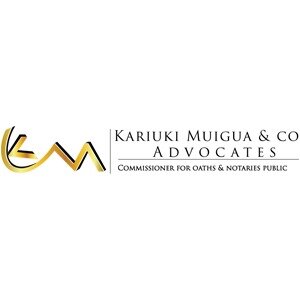Best Oil, Gas & Energy Lawyers in Kenya
Share your needs with us, get contacted by law firms.
Free. Takes 2 min.
Or refine your search by selecting a city:
List of the best lawyers in Kenya
Legal guides written by Adroit Law LLP:
- Kenya Launches Digital Nomad Visa: A Gateway for Remote Workers
- Navigating the Payment System License Maze in Kenya
- Navigating the Complexities of Mining Licenses and Permits in Kenya: A Look into Artisanal and Large-Scale Operations
About Oil, Gas & Energy Law in Kenya
Oil, Gas, and Energy Law in Kenya is an evolving field characterized by rapid developments aimed at resource management and sustainable energy use. The country has a wealth of natural resources, including oil and geothermal energy, which have recently gained international interest. Key regulatory frameworks govern exploration, production, distribution, and environmental impact. The sector is crucial to Kenya's economic growth, attracting numerous local and foreign investments to harness energy resources effectively.
Why You May Need a Lawyer
There are several situations in which you might require legal assistance in the Oil, Gas, and Energy sector. These include:
- Negotiating and drafting contracts for resource exploration and exploitation.
- Compliance with local laws and international standards.
- Resolving disputes related to land use, environmental conservation, or employment.
- Acquiring licenses and permits necessary for operations.
- Advising on investment opportunities and partnerships.
Having a lawyer ensures that your interests are safeguarded in such complex transactions and regulatory landscapes.
Local Laws Overview
The legal landscape in Kenya related to Oil, Gas, and Energy is regulated by various laws and government agencies. Key frameworks include:
- The Energy Act: Governs production, supply, and use of energy.
- The Petroleum Act: Regulates exploration, development, and production of petroleum resources.
- The Environmental Management and Coordination Act: Ensures environmental sustainability in energy projects.
- The Land Act: Governs land use, crucial for geothermal and other energy projects.
These laws lay down the foundation for the processes involved and the rights and responsibilities of stakeholders in the sector.
Frequently Asked Questions
What permits are required for oil exploration in Kenya?
You will need an exploration license from the Ministry of Petroleum and Mining after an initial competitive tendering process.
How is land compensation handled for energy projects?
Compensation is addressed under the Land Act, which mandates fair and prompt compensation to affected landowners.
What is local content policy?
Local content policies refer to regulations ensuring the participation of local businesses and employment in the industry.
How do environmental regulations affect energy projects?
Projects must comply with Environmental Impact Assessments (EIA) to minimize adverse environmental impacts.
Can foreigners invest in Kenya’s energy sector?
Yes, foreign investments are allowed, subject to compliance with national laws and regulations.
What role does the Kenya Power and Lighting Company (KPLC) play?
KPLC is responsible for the transmission and distribution of electricity within Kenya.
Are there tax incentives for renewable energy projects?
Yes, there are tax incentives for renewable energy projects under Kenya's tax laws to encourage investment in sustainable energy.
What is the role of the Energy and Petroleum Regulatory Authority (EPRA)?
EPRA regulates the energy sector ensuring compliance with standards for efficient use and protection of the environment.
How are energy disputes resolved in Kenya?
Disputes can be resolved through negotiation, mediation, arbitration, or litigation, depending on the agreement of involved parties.
Can community land be used for energy projects?
Yes, but it requires adherence to specific processes involving community engagement and consent under the Community Land Act.
Additional Resources
Consider exploring the following resources and organizations for more information:
- Ministry of Petroleum and Mining: Oversees policies and licensing for petroleum activities.
- Energy and Petroleum Regulatory Authority (EPRA): Regulates the energy sector for economic efficiency.
- The National Oil Corporation of Kenya (NOCK): Facilitates local oil exploration and distribution.
- The Kenya Renewable Energy Association (KEREA): Promotes renewable energy development and utilization.
Next Steps
If you require legal assistance in the Oil, Gas, and Energy sector, consider taking the following steps:
- Identify your specific legal needs and the relevant areas of concern.
- Research and contact a reputable lawyer or law firm specializing in energy law.
- Schedule consultations to discuss your case and related legal steps comprehensively.
- Ensure that your legal representative is well-versed with the local and international standards applicable in your case.
Reliable legal advice is crucial in protecting your interests and ensuring compliance with established laws and regulations in this dynamic field.
Lawzana helps you find the best lawyers and law firms in Kenya through a curated and pre-screened list of qualified legal professionals. Our platform offers rankings and detailed profiles of attorneys and law firms, allowing you to compare based on practice areas, including Oil, Gas & Energy, experience, and client feedback.
Each profile includes a description of the firm's areas of practice, client reviews, team members and partners, year of establishment, spoken languages, office locations, contact information, social media presence, and any published articles or resources. Most firms on our platform speak English and are experienced in both local and international legal matters.
Get a quote from top-rated law firms in Kenya — quickly, securely, and without unnecessary hassle.
Disclaimer:
The information provided on this page is for general informational purposes only and does not constitute legal advice. While we strive to ensure the accuracy and relevance of the content, legal information may change over time, and interpretations of the law can vary. You should always consult with a qualified legal professional for advice specific to your situation.
We disclaim all liability for actions taken or not taken based on the content of this page. If you believe any information is incorrect or outdated, please contact us, and we will review and update it where appropriate.
Browse oil, gas & energy law firms by city in Kenya
Refine your search by selecting a city.

















